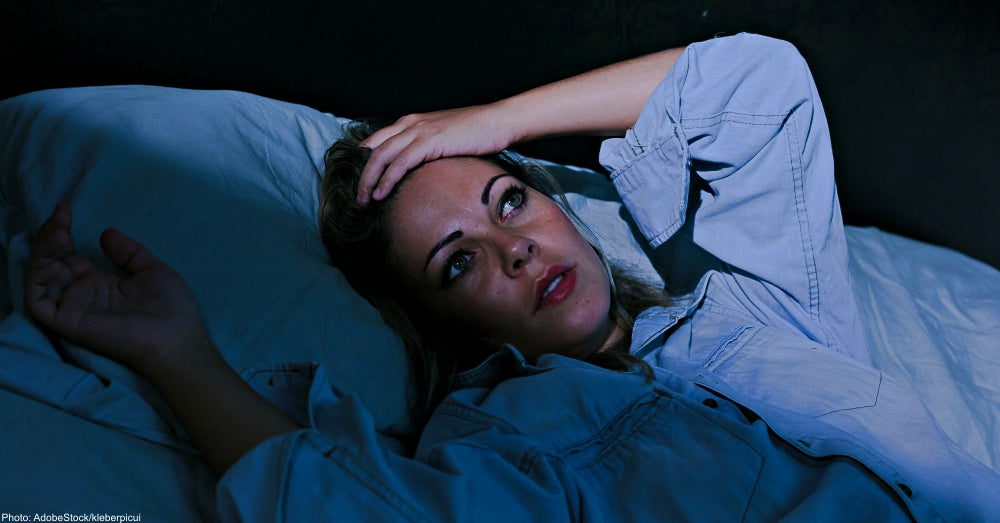Breast Cancer And Insomnia: Why It Happens And 10 Things You Can Do To Improve Your Sleep
Katie Taylor
Breast cancer patients are tired. They're exhausted and they could use a good night's rest, but isn't it always the case that the one thing you need is the one thing that's hardest to get?
Nearly 70 percent of women with breast cancer have trouble sleeping, and more than 60 percent of women with cancer are diagnosed with insomnia. Trouble sleeping is more common in breast cancer patients than in the age-matched general population and in people with other types of cancer. Causes for sleeplessness in breast cancer patients are both treatment-related and non-treatment-related.
Of course, a sleepless night now and then is normal. But insomnia, or the inability to fall or stay asleep for days on end, causes changes in mood, energy levels, and your ability to concentrate. Insomnia robs you of quality of life, and if you're undergoing cancer treatment, that's something you can't afford to lose.
 Photo: AdobeStock/Ozgur Coskun
Photo: AdobeStock/Ozgur Coskun
Treatment-Related Causes of Sleeplessness/Insomnia:
- Certain chemotherapy medicines, like Ixempra, can cause insomnia
- Targeted therapy, like Tykerb
- Hormonal therapies
- Certain pain medications
- Treatments that cause menopause symptoms like sleep-disturbing hot flashes and night sweats
Non-Treatment-Related Causes of Sleeplessness/Insomnia:
- Cancer or treatment-related pain
- Cancer tumors themselves can negatively impact sleep
- Fear of recurrence
- Anxiety about treatment, outcomes, or family members
- Worry about body image
But more important than knowing why breast cancer causes insomnia is knowing how to combat it. While medication can work in some cases, they should be considered carefully as some sleep-aids can cause addiction or interfere with treatment, and others haven't been studied throughly. Here are 10 things to try to improve your sleep quality:
1. Embrace a sleep schedule
It's easy to dismiss sleep schedules as only for toddlers and pets, but the truth is that adults sleep better when they sleep on a schedule. Your body thrives on a schedule, so aim to go to bed and get up at the same time every day. Yes—even on weekends!
2. Consume Thoughtfully
Spicy food, caffeine, and alcohol can all mess with your sleep. Limit these treats and consume them earlier in the day so your body has time to flush. People metabolize caffeine differently, but most cups of coffee or energy drinks will give you a boost for about four to six hours. And while alcohol can make you sleepy, it can damage sleep quality and make you wake up early.
Spicy food, or any food that bothers you, should be avoided near bedtime, as should large meals in general as they can cause nighttime heartburn.
 Photo: AdobeStock/kanachaifoto
Photo: AdobeStock/kanachaifoto
3. Go For Dark
Light, especially blue light from cell phones and other electronics, helps signal to your body that it's time to wake up and seize the day. That's great if it's 8am, but not when you're trying to settle down. Cut off your exposure to electronics an hour before you go to bed—try saving that last hour for a relaxing activity like reading or meditating. Give yourself time to wind down before bed so that your brain is not still racing when you lie down.
Your brain can detect light even through your closed eyelids, so use as little light as you can during the night. Turn digital clocks away from you and don't check your phone if you wake up too early. If you can't avoid light, try a sleeping mask.
 Photo: AdobeStock/leszekglasner
Photo: AdobeStock/leszekglasner
4. Nap With Caution
An afternoon nap can seem like the ultimate indulgence, and it would be wrong of us to recommend swearing them off forever. But be careful: daytime naps can make it harder to get a good night's sleep. If you must nap, experts agree that just 20 minutes can leave you feeling refreshed, whereas longer naps can make you groggy and steal nighttime slumber. And even power naps shouldn't happen too late in the day.
 Photo: AdobeStock/Focus Focus LTD
Photo: AdobeStock/Focus Focus LTD
5. Go For Quiet
Noise can also disturb your sleep cycle. If noise is coming in from outside, try heavy curtains or a rug to help absorb the noise. If that doesn't help, you can try a white noise machine, soothing music, or even earplugs. Since your sleep cycles take you through heavier and lighter periods of sleep, sudden noises during the lighter periods can wake you up.
6. Make your bedroom a sanctuary
You want your brain to associate your bedroom with calm, peace, and rest—not mayhem, entertainment, and last-minute tasks. It's hard, but experts recommend reserving your bedroom only for sleeping and sex. Keep stressful and stimulating items (to-do lists, calendars, televisions, and messes) out of your bedroom. Instead, fill your bedroom with calming items or colors that help you feel relaxed.
Our lives are busy, but protect your health and your sleep by drawing a hard line at your bedroom door and finish work and other tasks elsewhere.
 Photo: AdobeStock/XtravaganT
Photo: AdobeStock/XtravaganT
7. Exercise
Exercise releases feel-good hormones and uses energy so that you'll feel calm at the end of the day. It also helps relieve stress, so you won't be as apt to be caught in the endless "what-ifs" at night when you're trying to sleep. But exercise will rev you up initially, so try to exercise five to six hours before you plan to sleep. Making time for a workout is definitely worth a good night's rest!
8. Try Something relaxing
Again, your body does best on routine. Relaxation is important, so take part in a relaxing activity before bed every night. It can feel wonderful to do a few yoga poses and then slip off to bed. Gentle yoga and Tai Chi are great for calming your body and getting you ready for sleep, but if that's not your style, try mindful meditation, gentle breathing, a warm bath, or having someone give you a massage. These activities will both relax you and, as you establish your routine, signal your body that it's time for sleep. At the very least, ditch stressful activities an hour before bedtime.
 Photo: AdobeStock/Monkey Business
Photo: AdobeStock/Monkey Business
9. Keep It Cool
There's nothing worse than waking up in the middle of the night hot and sweaty. Our body temperature drops just before bedtime, and keeping our bedroom cool helps us maintain the ideal sleeping temperature (between 60 and 67 degrees Fahrenheit). If you get too hot, it's harder to go through your natural sleep cycles, meaning you'll have less restful sleep or wake up altogether. Keep your bedroom cool, and if you must be warm and cozy at bedtime, bundle up with blankets that you can take off later rather than by cranking up the heater.
 Photo: AdobeStock/Antonioguillem
Photo: AdobeStock/Antonioguillem
10. Talk to Your Doctor About Behavioral Therapy
Behavioral therapy is a type of mental health counseling that integrates relaxation techniques, bright light exposure, exercise programs, and other therapies to try to retrain the brain and improve sleep quality. Your doctor may be able to recommend therapies that will work for you in addition to or instead of prescription sleep aids.
There you have it! Sleep ought to be the easiest part of our day, but sadly that's often not the case, and breast cancer patients may have challenges that others can't appreciate. Be sure to talk to friends, a support group, or your doctor about your challenges so that you know you're not alone in your search for sleep. Rest easy, friends.


